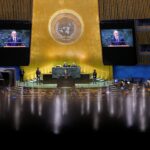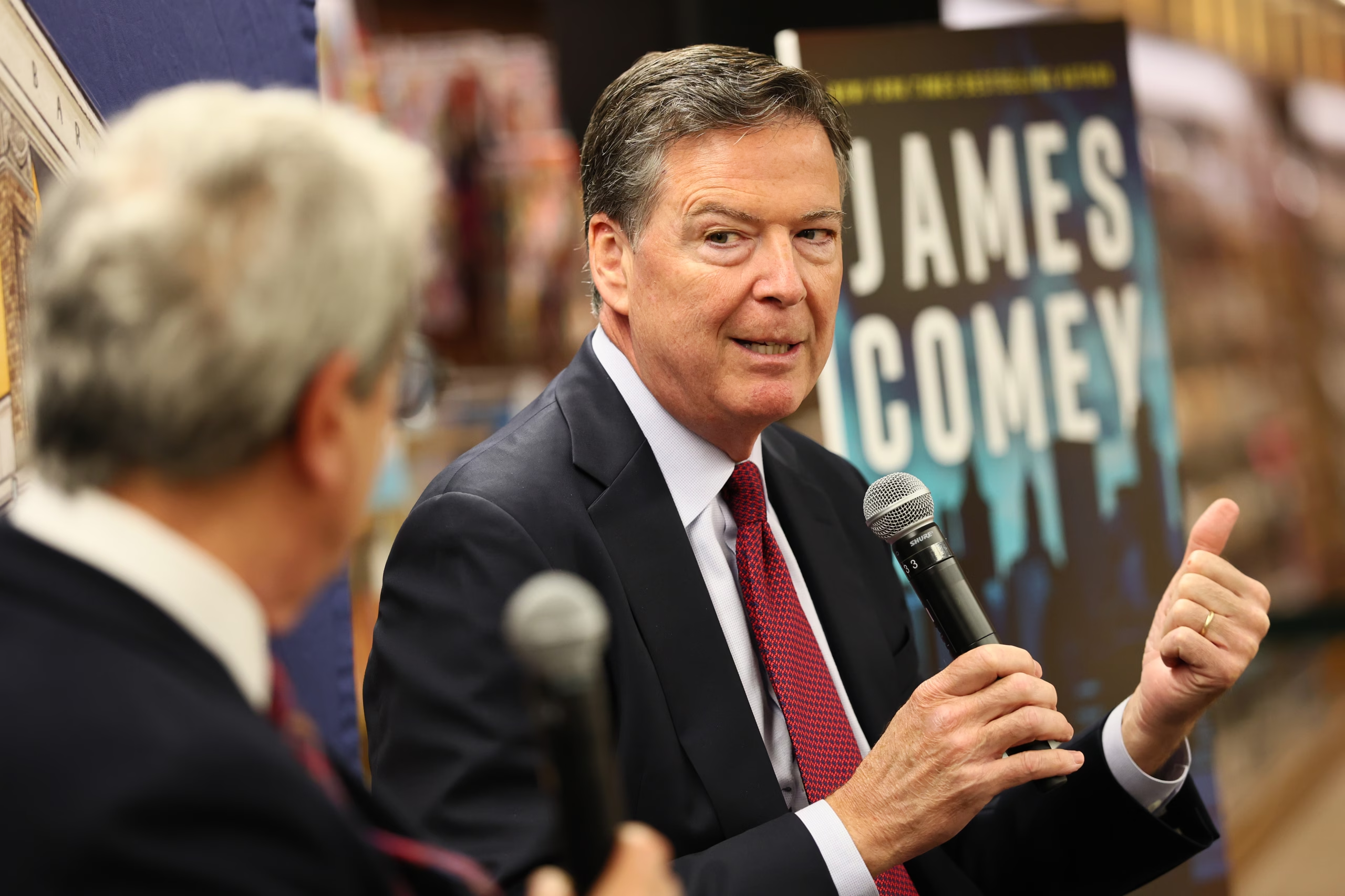
The 80th United Nations General Assembly (UNGA) begins this week in New York City, bringing together world leaders for a spectacle of speeches as the institution faces mounting scrutiny over its role on the global stage.
The annual gathering comes at a time of particular reckoning, not least marked by internal handwringing over unsustainable funding, ossified outrage over Israel’s ongoing war in Gaza, and increased urgency for non-Western countries to wield more influence.
- list 1 of 3Trump administration says it’s reviewing all 55 million US visa holders
- list 2 of 3The US government does not want any Palestinian to speak
- list 3 of 3Palestinian Authority urges US to reinstate Abbas’s visa before UNGA
end of list
Already sparking dismay ahead of this year’s event has been a decision by the United States, under the administration of President Donald Trump, to withhold or revoke visas for Palestinian Authority and Palestinian Liberation Organization officials to attend the gathering.
That comes as France and Saudi Arabia are set to host a conference on Israel and Palestine, promising to join several European countries in recognising a Palestinian state.
All told, according to Richard Gowan, the UN director at the International Crisis Group, the gathering comes during a year when “illusions have been rather stripped away”.
“It’s now very, very clear that both financially and politically, the UN faces huge crises,” he said. “Now the question is, is there a way through that?”
Here’s what to know as the UNGA session begins:
When does it start?
The proceedings officially start on Tuesday when the incoming president, former German Minister for Foreign Affairs Annalena Baerbock, is set to present her agenda for the coming session, which will run through September 8, 2026.
Advertisement
This year’s theme has been dubbed, “Better Together: 80 years and more for peace, development and human rights.”
The first week will be largely procedural, but will be followed by the organisation’s most prominent event, the so-called “high-level week”. That begins on September 22 at 9am local time (13:00 GMT), with a meeting to commemorate the UN’s 80th anniversary and to consider “the path ahead for a more inclusive and responsive multilateral system”.

On Tuesday, September 23, the “General Debate” begins, with at least 188 heads of state, heads of government, or other high-ranking officials preliminarily set to speak through September 29.
An array of concurrent meetings – focusing on development goals, climate change and public health – is also scheduled. Customary flurries of sideline diplomacy are in the forecast, too.
What does the UNGA do?
The UNGA is the main deliberative and policy-making body of the UN. It is the only body in the organisation where all 193 member countries have representation. Palestine and the Holy See have non-member observer status.
Under the UN Charter, which entered into force in 1945, the body is charged with addressing matters of international peace and security, particularly if those matters are not being addressed by the UN Security Council (UNSC), a 15-member panel with five permanent, veto-wielding members: France, China, Russia, the United Kingdom and the US.
The UNGA also debates matters of human rights, international law and cooperation in “economic, social, cultural, educational, and health fields”.
Operationally, the UNGA approves the UN’s sprawling annual budget, with one of its six main committees managing the funding of 11 active peacekeeping missions around the world.
Israel’s war in Gaza, which began in the wake of the Hamas-led attacks on southern Israel on October 7, 2023, largely defined last year’s gathering.
With Israel’s constant attacks, and atrocities continuing to mount, the war is expected to again loom large, with anticipation focusing on several countries that have recently recognised or pledged to recognise a Palestinian state.
Last week, Belgium became the latest country to pledge to do so at the UNGA, following France and Malta. Other countries, including Australia, Canada and the UK, have announced conditional recognition, but it has remained unclear if they will do so at the gathering.
![UN Secretary-General Antonio Guterres delivers a speech at the opening of the 58th session of the United Nations Human Rights Council in Geneva, on February 24, 2025 [Fabrice Coffrini/AFP]](https://www.aljazeera.com/wp-content/uploads/2025/02/AFP__20250224__36YG3W6__v1__HighRes__SwitzerlandUnRights-1740392078.jpg?w=770&resize=770%2C513&quality=80)
While recognition of Palestine as a full member of the UN would require UNSC approval, a move almost surely to be vetoed by the US, the increased recognition will prove symbolically significant, according to Alanna O’Malley, a professor of UN studies in peace and justice at Leiden University in the Netherlands.
Advertisement
“France’s recognition will be important, because it means that the only European member of the Security Council in a permanent seat is now recognising Palestinian statehood,” O’Malley told Al Jazeera, noting that 143 UN member states had already recognised a Palestinian state ahead of the most recent overtures.
“I think it puts pressure on the US, and then, in that regard, increases pressure on Israel,” she said. “But, of course, it also reveals that the European countries are far behind the Global South when it comes to the Palestinian issue and when it comes to cohesive action to combat the genocide.”
Multilateralism challenged from inside and out?
Despite UN leadership seeking to strike a celebratory tone as the institution marks its 80th year in existence, the last decade has been punishing for the global cooperation the body has long spearheaded.
During Trump’s first term, from 2017 to 2021, he withdrew the US from the landmark Paris Climate Accord, the World Health Organization (WHO) and the UN Human Rights Council. Former US President Joe Biden then reversed his predecessor’s actions only to see Trump repeat them upon taking office in January this year.
The Trump administration has undertaken widespread cuts to foreign aid, including hundreds of millions to UN agencies and caps on further spending. The US remains far and away the largest funder of the UN, providing about $13bn in 2023.
“The US funding caps have put the UN in an incredibly bad financial situation,” the International Crisis Group’s Gowan said.
Further adding to that instability have been questions over UN Secretary-General Antonio Guterres’s campaign to streamline and refocus the UN as part of what he has dubbed the “UN80 Initiative”.
Proposals under the initiative, which will appear in a preliminary budget later this month, have been opposed by some UN member states and staff, with employees in Geneva passing a motion of no confidence against the UN chief earlier this year.
“Guterres will be talking about his efforts to save money,” Gowan said. “But I think there’s going to be a lot of people asking if the UN really can continue at scale without very major institutional changes, because it just doesn’t have the cash any longer.”
A chance for new influence?
But this year’s gathering may also be marked by efforts by traditionally marginalised countries to take on a bigger role at the UN, according to Leiden University’s O’Malley.
While no country has shown a willingness or capability to fill the US’s financial commitments, China has for years sought more influence within the UN, particularly through funding peacekeeping missions.
Countries like South Africa and Jamaica have also leaned into UN mechanisms, notably its International Court of Justice (ICJ), to seek accountability for Israeli abuses in Gaza and climate change, respectively.
“I think a lot of Global South countries, especially those like Brazil and India, and South Africa and Indonesia, to a certain extent, are looking at this not as a crisis of multinationalism,” O’Malley said.
“This is an opportunity to remake the system of global governance to suit their ends more precisely, and also to serve their people more directly, since they represent most of the world’s population.”
This has, in turn, refreshed energy towards long-sought reforms, including expanding the number of permanent members on the UNSC, O’Malley said, while noting a clear pathway for such a reform still does not exist.
Advertisement
History-making moments?
The first weeks of the UN General Assembly are known for history-making moments: Venezuela’s Hugo Chavez calling George HW Bush “the devil”; Muammar Gaddafi’s 100-minute screed in 2019 against the “terror and sanctions” of the UNSC; Israeli Prime Minister Benjamin Netanyahu’s literal drawing of a red line under Iran’s nuclear programme.
It also includes Trump’s inaugural speech in 2017, when he first took the podium, pledging to, among other aims, “totally destroy” North Korea.
The bellicose speech was met with chortles from the foreign delegations gathered. The tone is likely to be much different this time around, as world leaders have increasingly embraced flattering the mercurial US leader.
At the same time, with rumblings of lower attendance due to Trump’s restrictions on foreign travel, it is not out of the question that this year’s event could be a swan song for the long-held tradition of kicking off the UNGA in the US, the International Crisis Group’s Gowan said.
“I do think that, down the road, when people are organising big events around the UN, they are going to say ‘Should we do this in Geneva or Vienna or Nairobi?’” he said.
“If the US isn’t going to give out visas, then what’s the point of trying to do the global meetings there?”
British Caribbean News


